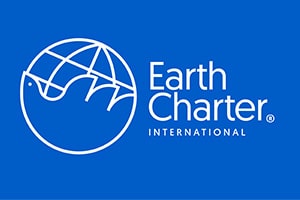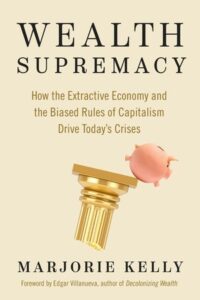Newsletter – August 29, 2023
(For more Newsletter Essays, visit HERE…)
Dear Friends,
Having recently celebrated my 86th birthday, I’m focused on what I want to accomplish in what time remains to me. With that in mind, my current priority is completing a white paper framing an “Eco-nomics for an Ecological Civilization.”
The underlying thesis is both simple and obvious. We are living beings and our wellbeing depends on the wellbeing of the living Earth. That requires equitably sharing and caring for the real wealth of the living Earth commons—all the conditions of Earth’s climate, air, soil, water, and much else created by and essential to life. One part of the draft eco-nomics paper explores the barrier posed by the “Great Wealth Illusion.”
Contemporary economics, which I call “ego-nomics,” embraces growth in purchases of goods and services (that we call GDP) and financial assets (that we call wealth) as the defining purpose of the economy. Many of the purchases, however, are harmful, such as weapons of war. And the money we call financial assets is not actual wealth. It is merely a number that has value only because we humans accept it in exchange for things of real value like food and water.
Growing the financial assets of billionaires does not itself grow anything of actual value. It merely increases the claims of those billionaires to ever more of the products of nature and people and gives them license to exploit those products to further grow their personal financial assets.
The details of the processes by which the great wealth illusion allows financial fraudsters to create imaginary financial assets to enrich themselves and impoverish the rest of us are complex beyond human comprehension. The basics, however, are quite simple and help to explain the current environmental crisis and extreme and growing inequality.
David Korten
The Great Wealth Illusion

David Korten | August 29, 2023
Over the past quarter century, we have allowed a growing band of financial predators to create counterfeit financial assets from nothing to grow their personal control of the real wealth of the natural and human commons on which our mutual wellbeing depends. Crypto currencies are an example of such counterfeit financial assets. The most common counterfeit assets are called derivatives that involve contracts to buy and sell artificial financial assets based on changes in the price of bundles of real assets owned by others.
In mid-2023, various sources estimated that the various forms of fictious financial assets totaled over $1 quadrillion, a substantial majority of the world’s total financial assets. This is more than 10 times the total world GDP, the estimated value of global financial exchange relating to the purchase and sale of real goods and services. Many of the fictitious assets are hidden in offshore tax havens. Not all the exchanges included in GDP are beneficial. But nearly all relate to something real.
Definitions of fictitious assets vary, and the statistics are imprecise, yet all the reported estimates are breathtaking in their quantity. In her forthcoming book Wealth Supremacy: How the Extractive Economy and the Biased Rules of Capitalism Drive Today’s Crises, Marjorie Kelly, a leading global authority on business ethics and ownership, observes that in the 1950’s financial assets in the United States were roughly equal to GDP. She reports that by conservative estimates, U.S. financial assets are now five times U.S. GDP. (See “From the Book Shelf,” below.)
The full implications become clear when we note that in mid-2023 the poorest 50% of the U.S. population owned only 2.5% of total U.S. financial assets. The richest 0.1% owned 12.8%.
Kelly points out that the world of finance is currently driven by two basic fallacies.
2. Capital Bias: The fallacy that profit (including to the already obscenely rich) is inherently good and therefore should grow. Labor, however, is an expense and its costs should be minimized.
Money is nothing but a number we choose to call wealth. Financial assets acquired by pillaging Earth are an attack on the wellbeing of life. Growing fictional assets of no intrinsic value adds nothing to Earth’s real wealth. It does, however, give those who create and own those fictitious assets added stature and power to further pillage Earth and exploit its people
Beneficial labor, by contrast, is essential to life and the wellbeing of both people and Earth. Beneficial labor should be favored, justly compensated, and recognized as the defining measure of our personal worth.
The valid purpose of business is to mobilize beneficial labor in the service of life. A modest profit is essential to business viability. But maximizing profit is not a valid business purpose.
The current growing hardship of those doing essential work for pittance compensation understandably creates intense public anger. Skin color, gender, and religion all have their role in shaping the unjust distribution of financial assets, but the defining issue is the extreme and growing class divide between rich and poor. The obscenely rich predator class deflects the anger of the extremely poor excluded class—including poor white males—away from the real source of their misery and against one another.
We are dealing with a corrupt financial system for which a substantial majority of current financial transactions are purely exploitative and best eliminated. The rest require major restructuring with a goal to move toward a middle-class classless society that provides a secure and meaningful life for all people with no extremes of wealth and poverty.
There are many specific reforms required to achieve the needed economic restructuring. They include a financial system in which money creation and allocation is transparent, accountable, localized, and dedicated to securing the wellbeing of Earth and all its people. A primary challenge is to eliminate the creation of financial derivatives while implementing serious progressive taxation to reclaim and cancel the massive pool of fictitious financial assets while equitably redistributing the rest.
An essential initial priority will be a modest global financial transactions tax of perhaps .5 percent on all financial market exchanges involving the purchase and sale of financial assets. This should immediately eliminate most high-speed speculative financial trading like the current $7.5 trillion per year speculative trades in the Forex (foreign exchange) markets. Yet such a tax will have no consequential impact on real investments or the purchase and sale of real goods and services.
The financial transactions tax can be followed by a series of genuinely progressive taxes on income, financial assets, and estates to reclaim and retire fictitious financial assets while achieving an equitable redistribution of real assets and assuring everyone access to a living wage and essential social services including education, health care, and retirement.
Local control and sharing of power are also an essential part of the needed reform. To this end, private financial institutions must be limited to doing business in the country that issues their charter and supervises their operation. Private global banks should be broken up and restructured as local cooperative banks owned by local depositors to provide basic banking services, including making loans to finance local home and business ownership.
Applying a traditional standard 10 percent reserve requirement on deposits will allow local cooperative banks to loan an amount up to 10 times the amount of their deposits. This will give local communities significant ability to create money locally to finance local housing and beneficial businesses and government projects of their choice without the complications and inefficiencies involved in creating and managing local currencies. Meanwhile, all other monopolistic profit-maximizing corporations should be broken up and restructured as worker and community owned cooperative enterprises dedicated to the wellbeing of the communities in which they do business.
The barriers to achieving these sensible reforms are monumental. A fundamental starting point is understanding that money is not wealth. Growing money simply grows claims against real wealth. It does not create or grow real wealth. Getting beyond inequality and the distortions caused by the wealth illusion is both within our collective human means and essential to securing a viable and mutually prosperous human future.
_____
Noteworthy …
 “Money, Money, Money” – from WNYC’s On the Media
“Money, Money, Money” – from WNYC’s On the Media
David recommends this July 14, 2023 podcast, which includes segments on the real driver of inflation and the processes by which mainstream economics was perverted. Hear about “greedflation” and “…how a century-long PR campaign taught Americans to love the free market and loathe their own government.”
Listen and/or read the transcript here…
We stand at a critical moment in Earth’s history…
The Earth Charter beautifully spells out defining principles of an Ecological Civilization. These 16 Principles stand on four pillars:
1. Respect and Care for the Community of Life
2. Ecological Integrity
3. Social and Economic Justice
4. Democracy, Nonviolence, and Peace
_____
From the Bookshelf…
“Marjorie Kelly has the rare ability to combine her decades of business-insider insight with the imagination and conviction to reinvent the future. Setting out entrenched systemic problems, she lucidly and compellingly counters them with inspiring systemic solutions. If you want to understand the economy we’ve inherited and create an economy worth bequeathing to our children, read this book.”
—Kate Raworth, author of Doughnut Economics
Marjorie is Distinguished Senior Fellow at The Democracy Collaborative and a leading theorist in democratic economy design, including next generation enterprise, place-based impact investing, and a next system of capital.
She is also the author of The Divine Right of Capital (2002), credited with inspiring the creation of the B Corporation movement, Owning Our Future: The Emerging Ownership Revolution (2012), and The Making of a Democratic Economy (2019).
If this newsletter was forwarded to you, please sign up HERE to receive your own copy. For more Newsletter Essays, visit HERE…

